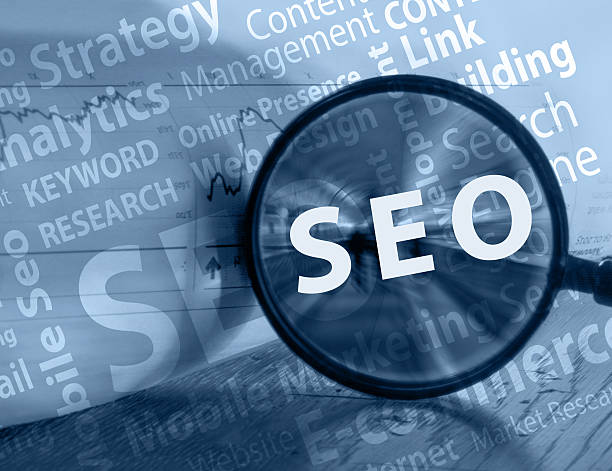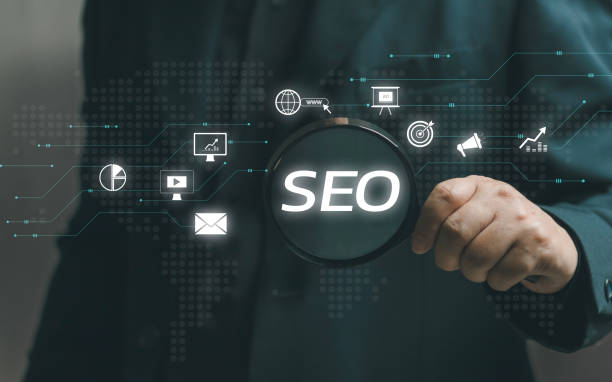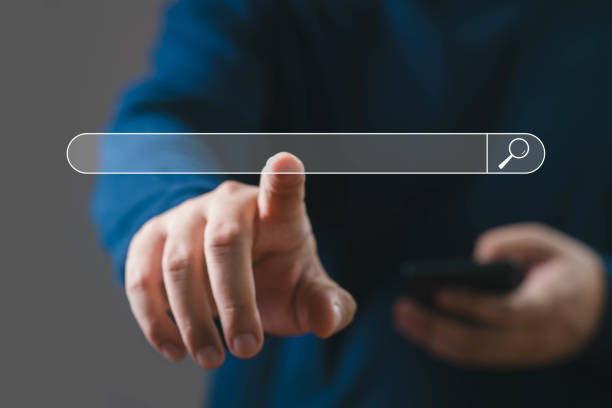Introduction to Off-Page SEO and Its Importance in the Digital World

In today’s highly competitive world, #SEO and website optimization for search engines are no longer an option, but a vital necessity.
Among these, #Off-Page_SEO, or #Off-Page_SEO, plays a pivotal role in determining a site’s credibility and ranking.
This part of optimization focuses on activities performed outside your website, with the main goal of increasing domain authority and building trust with Google.
Imagine your website is a book; internal SEO deals with the quality of writing and content of the book, while off-page SEO deals with the number of references and citations from other books and authors to that work.
The more credible and numerous the references, the more authoritative your book will be among readers and critics.
Off-page SEO is not just about building backlinks, but includes a wide range of activities such as advertorials, social media activity, online branding, and even user reviews.
The ultimate goal of all these activities is to signal to search engines like Google that your website is a reliable, authoritative, and valuable resource for users.
Without a strong off-page SEO strategy, even the best internal content may go unnoticed among a multitude of competitors.
This article comprehensively and explainably helps you get acquainted with various aspects of off-page SEO and develop an effective strategy for your website. In this guide, we will step-by-step examine the details and advanced techniques in this field so that you can, with full awareness, not only improve your site’s ranking but also attract quality and stable traffic.
This is an educational section that lays the foundation for your understanding of off-page optimization and shows you why this aspect of SEO is essential for online success.
Disappointed with your e-commerce site’s low conversion rate? Rasawab turns your e-commerce site into a powerful tool for attracting and converting customers!
✅ Significant increase in visitor-to-buyer conversion rate
✅ Unique user experience to boost customer satisfaction and loyalty⚡ Get free consultation from Rasawab!
How Off-Page SEO Builds Your Website’s Authority?

Off-page SEO is the backbone of your online credibility. Search engines don’t solely rely on internal content for ranking pages; instead, they look for signals from outside your site to assess your popularity, authority, and expertise.
The most important and well-known factor in off-page SEO is backlinks.
A backlink from a credible and relevant website acts as a strong vote of confidence for your site.
Google considers these links as recommendations from other sources, indicating the value and usefulness of your content.
The more high-quality and relevant backlinks you have, the higher your site’s “Domain Authority” and “Page Authority” will be.
This increased authority, in turn, makes search engines trust you more, resulting in your pages ranking higher in search results.
In addition to backlinks, social media activity and content sharing indirectly impact off-page SEO.
Although social signals are not directly involved in rankings, they can lead to greater content visibility and ultimately attract natural backlinks.
Also, mentioning your brand name on other websites (without a link), known as “Brand Mentions,” can also act as a positive signal for search engines.
Search engines, especially Google, use complex algorithms like PageRank (though much more advanced versions of it) to evaluate the value and quality of links.
This value does not only come from the number of links but is also influenced by the quality and authority of the linking domains, the relevance of the link, and even its position on the page.
Understanding these mechanisms and implementing them correctly is one of the fundamental principles of a successful off-page SEO strategy, and it will undoubtedly put you a step ahead of your competitors.
This analytical section helps you understand the profound impact of off-page SEO and how every link and brand mention can be a building block in constructing your online authority.
Key Strategies for Building High-Quality Backlinks

Building high-quality backlinks forms the core of successful off-page SEO.
However, quality takes precedence over quantity.
Spammy and low-quality backlinks are not only unhelpful but can lead to Google penalties. Effective strategies include the following:
- Content Marketing and Valuable Content Creation: Producing content that is inherently linkable is the cornerstone of attracting natural backlinks.
This content can include infographics, case studies, free tools, in-depth articles, and comprehensive guides.
When your content is good enough that others want to link to it, the link-building process becomes much easier.
A prime example is a comprehensive and unique study in your industry that no one else has provided. - Link Building through Guest Posting: Writing articles for other websites in your industry is one of the most common and effective methods.
This allows you to showcase your expertise while receiving a valuable backlink from a relevant and authoritative site.
Choosing relevant sites with high domain authority is crucial.
For success, you should look for sites that have a similar audience to yours and whose content aligns with your topic. - Utilizing Broken Link Building: This technique involves finding broken links on other websites and suggesting replacing them with your own similar content.
This is a win-win strategy; you get a backlink, and the target website resolves its broken link issue.
Tools like Ahrefs or Screaming Frog can be useful in finding broken links.
Identifying websites that operate in your niche and then checking their external links for broken ones is the first step. - Influencer Marketing: Collaborating with influencers and influential individuals in your field can lead to receiving links and increasing brand authority.
They can introduce your products or services to their audience and create natural links to your site. - Offering Free Services or Products: If you have a product or service that you can offer a free or trial version of, it can attract the attention of bloggers and reviewers and lead to link building.
There are many successful examples of this method in the field of software and online tools.
These methods are considered “White Hat” strategies in off-page SEO and ensure the long-term stability and security of your website.
This section provides practical guidance for you to increase your online authority by focusing on quality and relevance.
Keep in mind that building a strong and natural backlink profile is time-consuming and requires continuous patience and follow-up.
Types of Backlinks and Their Impact on SEO
| Backlink Type | Description | Impact on Off-Page SEO |
|---|---|---|
| Editorial Links | Links that are naturally placed within the text of relevant articles. | High (Very Valuable) |
| Guest Post Links | Links obtained from articles written by you on other sites. | Medium to High |
| Directory Links | Links received from website directory listings. | Low to Medium (depending on directory quality) |
| Comment/Forum Links | Links obtained through commenting on blogs or participating in forums. | Very Low (often nofollow and spammy) |
| Social Media Links | Links created from social media profiles or posts. | Indirect (social signals) |
The Importance of Competitor Analysis in Your Off-Page SEO Campaign

To have a successful off-page SEO campaign, the importance of competitor analysis cannot be overlooked.
Your competitors, especially those ranking high for your target keywords, are a treasure trove of valuable information regarding off-page SEO strategies.
By examining their backlink profiles, you can discover the link sources that have been successful for them.
This specialized analysis includes reviewing the following:
- Backlink Sources: From which websites have they received links? Are these sites authoritative? What types of domains are they (.edu, .gov, .org, .com)? Reviewing these helps you target quality domains for your link building.
- Link Types: Are the links dofollow or nofollow? Do they come from directories, guest blogs, or editorial content? This information shows what types of link-building strategies your competitors have adopted.
- Anchor Text: What texts have they used for their inbound links? Have they used exact match anchor texts with keywords, brand names, or a combination? Diversity in anchor text is very important, and lack of diversity can be a sign of manipulation.
Analyzing competitors’ anchor texts helps you create a natural anchor text profile for yourself. - Link Building Velocity: At what speed have they built links? Does this speed seem natural, or are there signs of spam? Modeling the natural link-building pace of competitors can save you from Google penalties.
- Broken Links: Do your competitors have broken links on their websites that you can leverage for link building? This is an excellent opportunity to provide value to the target website and receive a link in return.
Tools like Ahrefs, SEMrush, and Moz can assist you in this analysis.
By identifying the strengths and weaknesses of competitors’ off-page SEO strategies, you can fill gaps and even surpass them.
This analytical information provides a roadmap for your off-page optimization campaign.
This specialized approach not only helps you identify the best link-building opportunities but also prevents common mistakes that could lead to Google penalties.
A comprehensive analysis gives you a strategic perspective for competing in search results.
How much does losing business leads due to an unprofessional site cost you? Solve this problem forever with professional corporate website design by Rasawab!
✅ Increase credibility and trust of potential customers
✅ Easier attraction of new business leads
⚡ Get free consultation now!
The Role of Social Media in Boosting Off-Page SEO

It might seem that social media does not directly affect Google rankings and their links are often “nofollow,” but their indirect and very strong impact on off-page SEO cannot be ignored.
Effective activity on social networks can act as a catalyst and indirectly contribute to your off-page SEO goals.
How?
- Increased Content Visibility: When your content is shared on platforms like Twitter, LinkedIn, Facebook, or Instagram, it gains a greater chance of being seen by a wider audience.
This increased visibility can lead to attracting traffic, boosting brand awareness, and ultimately encouraging other websites and bloggers to link to your content.
The more your content is shared, the higher the probability that it will be noticed by media and influencers and linked to. - Brand Strengthening: A strong and active presence on social networks makes your brand more credible and recognizable.
Google pays more attention to strong and popular brands, even if this popularity stems from social signals.
Mentions of your brand on social networks and an increase in your brand searches can help your ranking.
This signals to Google that your brand has credibility and popularity among users. - Attracting Referral Traffic: Although social links are usually nofollow, they can drive significant traffic to your website.
This traffic, in turn, can lead to increased user engagement with the site, reduced bounce rate, and extended time on site, all of which are positive signals for Google.
Direct and quality traffic from social networks is an indication of your content’s value. - Link Building Opportunities: By building relationships with influencers and thought leaders on social networks, you can create new link-building opportunities (such as guest blogging or advertorials).
Networking on these platforms can be a gateway to valuable backlinks.
Therefore, a comprehensive off-page SEO strategy must also include an active and targeted presence on social media.
Proper social media management can indirectly but powerfully impact your domain authority and ranking in search results.
This explanatory approach shows you how to leverage the power of social networks for SEO purposes and ultimately create a cohesive and efficient off-page optimization strategy.
Advertorials: Hidden Potential in Off-Page SEO

Advertorials (Advertorial or Native Advertising), are one of the most powerful yet controversial methods in the field of off-page SEO.
This method involves publishing your advertising or branding content in the form of a news or analytical article on news websites, online magazines, or high-traffic blogs.
The main goal of an advertorial is to obtain high-quality backlinks and increase brand awareness in a reputable and trustworthy environment.
Why are advertorials important in off-page SEO?
- Credibility and Trust: Links received from reputable news websites and magazines have very high credibility.
Google places a lot of trust in these sources, and a link from them to your site will significantly impact your ranking.
This is because Google considers these links as powerful recommendations from sources that themselves have high authority. - DoFollow Links: Unlike many social platforms, links within advertorials are usually DoFollow, meaning they directly transfer SEO value (Link Juice) to your site.
This transfer of value significantly helps improve your domain and page authority. - Precise Targeting: You can choose websites where your target audience is present.
This not only helps with SEO but also brings targeted and high-quality traffic to your site.
This traffic leads to increased conversion rates and user engagement. - Content Control: You have complete control over the content of the advertorial, so you can ensure that your message is conveyed correctly and the links are placed within your desired keywords.
This customization capability makes advertorials much more effective than other methods.
However, it should be noted that improper use of advertorials can carry risks.
Google emphasizes that paid links must be marked with a “sponsored” or “nofollow” tag to prevent algorithm manipulation.
Nevertheless, if the advertorial is written naturally, content-driven, and with the aim of adding value for the audience, it can be an invaluable tool for increasing domain authority and improving rankings in off-page optimization.
For success, choosing relevant platforms, producing engaging and non-promotional content, and ensuring links are naturally and relevantly placed within the text are of high importance.
This is expert guidance for using this powerful tool in your off-page SEO strategy.
Differences Between Nofollow, Dofollow, UGC, and Sponsored Links in Off-Page SEO

In the discussion of off-page SEO and backlinks, understanding the different types of links and their attributes is crucial.
These attributes tell search engines how to treat a particular link.
The three main types that Google has recommended to us are:
- DoFollow Link (Default): This type of link is present in HTML by default and requires no special attribute.
Its purpose is to be followed by search engines and to transfer “Link Juice” or SEO value from the source site to the destination site.
These are the most valuable types of links for off-page SEO because they directly impact your authority and ranking and represent a strong vote of confidence. - NoFollow Link (rel=”nofollow”): This attribute tells search engines not to follow this link and not to transfer any “Link Juice” to the destination site.
It is typically used for links to spam content, paid links, or user comments (over which we have little control).
Although they do not directly help with SEO, having a mix of nofollow and dofollow links in your backlink profile can appear natural and not suspicious to Google.
In recent years, Google has stated that it treats the nofollow tag not as a directive, but as a “hint.” - UGC Link (rel=”ugc”): This attribute was introduced by Google in 2019 and is used to identify User Generated Content such as comments and forum posts.
This is a signal to Google that this link was created by ordinary users, not the site owner, and helps Google better understand the link’s source. - Sponsored Link (rel=”sponsored”): This attribute was also introduced in 2019 and is used to identify links created due to advertisements, sponsorships, or paid placements (such as paid advertorials).
This informs Google that it is a paid link and should not be considered a natural recommendation, but it allows the site to publish them without worrying about penalties for paid links.
Proper use of these attributes in your off-page optimization campaigns is essential. Failure to observe them can lead to penalties from Google.
For example, if you publish paid links as dofollow, you may face a penalty.
This explanatory and specialized section helps you deeply understand these concepts so you can create a natural backlink profile that complies with Google’s guidelines.
Understanding these differences is a crucial part of a successful off-page SEO strategy.
Comparison of Dofollow, Nofollow, UGC, and Sponsored Link Characteristics
| Feature | DoFollow (Default) | NoFollow | UGC (rel=”ugc”) | Sponsored (rel=”sponsored”) |
|---|---|---|---|---|
| Link Juice Transfer | Yes | No (Hint for Search Engine) | Often No (Hint for Search Engine) | No (Hint for Search Engine) |
| Primary Purpose | Natural Content Recommendation | Preventing authority transfer, preventing spam | Identifying User Content | Identifying Paid/Advertising Links |
| Common Use Cases | In-content links, reputable sources | Comments, forums, spammy links, old paid links | Blog comments, forum posts, user profiles | Advertorials, banner ads, sponsored links |
| Impact on Ranking | Direct and Strong | Indirect (part of a natural profile) | Indirect (part of a natural profile) | Indirect (no penalty and profile naturalization) |
Essential Tools for Off-Page SEO Analysis and Management

For success in your off-page SEO campaign, access to the right tools for analyzing, monitoring, and managing backlinks is vital.
These tools allow you to meticulously examine your own and competitors’ backlink profiles and identify new link-building opportunities.
Below, we introduce some of the most important ones:
- Ahrefs: Undoubtedly one of the most powerful Off-Page SEO tools on the market.
Ahrefs has the largest backlink database in the world and allows you to:- Analyze the backlink profile of any domain and see where they have received links from.
- Find broken links on your own site or other sites and discover link-building opportunities.
- Discover new link-building opportunities by analyzing competitors, including identifying “content gaps” or sites that have linked to competitors but not to you.
- Analyze keywords and get content ideas that have high link-attraction potential.
- SEMrush: This tool is also a comprehensive SEO suite that offers excellent capabilities in off-page SEO.
SEMrush helps you:- Perform competitive backlink analysis and identify competitors’ strengths and weaknesses in this area.
- Identify link-building opportunities, including news sites and blogs active in your niche.
- Check the health of your backlink profile and identify suspicious or spammy links.
- Receive comprehensive reports on domains and backlinks to track your progress.
- Moz Link Explorer: The Moz Link Explorer tool (part of Moz Pro) is also very useful for checking backlinks.
This tool provides metrics such as Domain Authority (DA) and Page Authority (PA), which are very practical for gauging link authority and help you evaluate the quality of your links and those of competitors. - Google Search Console: Although not a link-building tool, Google Search Console (a free Google tool) provides vital information about inbound links to your site (backlinks) as well as internal links.
You can use this tool to identify suspicious or spammy links and submit a Disavow (link rejection) request to Google to prevent potential damage.
Using a combination of these tools provides a comprehensive and deep insight into the state of your off-page optimization and that of your competitors. This educational and guiding section clarifies the path to using these tools so you can make informed decisions in your off-page SEO campaign with accurate data.
Although paid tools come with a cost, their return on investment in improving rankings and traffic, justifies this investment.
Do visitors abandon your e-commerce site before making a purchase? Worry no more! With Rasawab’s professional e-commerce website design services, solve the problem of not converting visitors into customers forever!
✅ Significant increase in conversion rates and sales
✅ Unique and engaging user experience
⚡ Contact us now for a free consultation!
Challenges and Common Mistakes in Implementing an Off-Page SEO Strategy
![]()
Implementing a successful off-page SEO strategy is not without challenges, and common mistakes can harm your site’s ranking instead of improving it.
Awareness of these mistakes can save you from falling into Google’s penalty traps.
Below, we point out some of the most important ones:
- Sole Focus on Backlink Quantity Instead of Quality: This is the biggest and most dangerous mistake.
Building thousands of backlinks from spammy, low-quality, or irrelevant sites is not only unhelpful but will certainly lead to a Google penalty.
Quality of links (domain authority, relevance, naturalness) always takes precedence over their number.
A backlink from a reputable site is thousands of times more valuable than dozens of low-quality links. - Unnatural Link Building Velocity: If your website suddenly receives a large number of backlinks, it can appear suspicious to Google.
The link-building process should be slow and consistent, following a natural pattern.
Such sudden fluctuations, especially for new sites, can be considered an attempt to manipulate algorithms. - Overuse of Exact Match Anchor Texts: Repeated use of anchor texts that exactly match your target keywords is a red flag for Google and can be a sign of manipulation.
Diversity in anchor texts (brand, raw URL, generic phrases, LSI keywords) is essential for your link profile to appear natural. - Ignoring Nofollow Links: Although nofollow links do not directly boost rankings, their presence in your backlink profile is natural and shows Google that your links are organic.
Solely pursuing dofollow links appears unnatural and can raise Google’s suspicion. - Lack of Regular Backlink Profile Review: You should regularly check your backlink profile for spammy or malicious links.
Competitors might send negative links towards your site (Negative SEO) to harm your ranking.
Using Google’s Disavow tool to disclaim these links is essential. - Link Building from Irrelevant Websites: A link from an irrelevant site has very little value and can even be harmful.
Always look for link-building opportunities in areas related to your business.
Thematic relevance of domains is very important.
These challenges are thought-provoking and require vigilance and precision. By avoiding these common mistakes, you can harness the full potential of off-page optimization and stay safe from Google’s algorithmic penalties.
This thought-provoking and analytical content section helps you advance your off-page SEO strategy more carefully by understanding these obstacles.
Off-Page SEO in the Future: New Trends and How to Prepare

The world of SEO is constantly changing and evolving, and off-page SEO is no exception.
Google’s algorithms are becoming smarter and placing more emphasis on natural and user-centric signals.
Preparing for future trends is crucial for maintaining your competitive position.
Some new trends and important points for the future of off-page SEO include:
- Increased Emphasis on Brand Mentions and E-A-T: Google places more emphasis on the concept of E-A-T (Expertise, Authoritativeness, Trustworthiness) and recently E-E-A-T (Experience, Expertise, Authoritativeness, Trustworthiness).
This means Google looks not only at backlinks but also at mentions of your brand in reputable sources (even without direct links), user reviews, and your overall reputation in the industry.
Building a strong brand and having an active presence in online communities is becoming increasingly important. - Artificial Intelligence and Natural Language Processing: With the advancement of Artificial Intelligence (AI) and large language models, Google has become much stronger at understanding semantic connections between various websites and content.
This means that link building based solely on keywords is no longer sufficient; content must truly be relevant and high-quality, capable of answering complex user questions. - Greater Importance of Content Quality: Links are still important, but linking to weak or worthless content will have little impact.
The focus should be on producing outstanding content that naturally attracts links and solves real user problems.
This is an “educational and guidance” approach for the future that emphasizes creating real value. - Diversity in Link Sources: Don’t just look for backlinks from blogs and news sites.
Links from videos, podcasts, infographics, and even web applications can play a more prominent role in the future.
A diverse link profile is more natural and resilient to algorithm changes. - Security and Privacy: With increased emphasis on web security (HTTPS) and user privacy (such as GDPR and CCPA regulations), sites that comply with these standards will receive more positive signals.
This indirectly affects credibility and, consequently, off-page SEO.
The future of off-page optimization is moving towards becoming more natural, content-centric, and reliant on genuine brand authority. Awareness of these trends and adapting your strategies will ensure your long-term success.
This news and analytical section offers a glimpse into the future that can also be entertaining for SEO specialists.
Frequently Asked Questions
| Question | Answer |
|---|---|
| What is Off-Page SEO? | Off-page SEO refers to a set of activities and methods performed outside your website to improve its ranking in search engines, such as building backlinks. |
| Why is Off-Page SEO important for a website? | Off-page SEO shows search engines that your website is credible, popular, and trustworthy, which helps increase domain authority and ranking. |
| What is the most important factor in Off-Page SEO? | Backlinks, or links from other sites to your site, are the most important factor, especially if they are from authoritative sites. |
| What are the characteristics of a quality backlink? | A quality backlink comes from reputable sites (with high authority), is relevant to your site’s topic, and has appropriate (natural) anchor text. |
| Do social networks play a role in Off-Page SEO? | Yes, sharing content on social networks can help increase visibility and indirect traffic, sending positive social signals to search engines. |
| What is a PBN and is it recommended? | A PBN (Private Blog Network) is a network of private websites used to build backlinks to the main site. Google considers this method spam, and its use is strongly discouraged and can lead to penalties. |
| How is Natural Link Building done? | By producing valuable and shareable content, connecting with bloggers and influencers, and attracting media attention. |
| What is Anchor Text in a backlink? | It is the text within which the link is embedded. Using diverse anchor texts relevant to the keyword appears more natural and helps with SEO. |
| How does Local SEO relate to Off-Page SEO? | Local SEO includes off-site activities such as Google My Business listings, local directories, and obtaining online reviews, which help businesses appear in local search results. |
| How can competitor backlinks be checked? | By using tools like Ahrefs, Semrush, or Moz, you can analyze competitors’ backlink profiles and identify new link-building opportunities. |
And other services of RasaWeb Advertising Agency in the field of advertising
Smart Marketing Automation: A dedicated service for online growth based on custom programming.
Smart Google Ads: A professional solution for customer acquisition focusing on precise audience targeting.
Smart Marketing Automation: A fast and efficient solution for improving SEO ranking by focusing on marketing automation.
Smart Digital Branding: Designed for businesses looking to attract customers through marketing automation.
Smart Direct Marketing: A combination of creativity and technology to increase website traffic by optimizing key pages.
And over hundreds of other services in the field of online advertising, advertising consulting, and organizational solutions
Online Advertising | Advertising Strategy | Advertorials
Sources
Comprehensive Off-Page SEO Guide
Techniques for Improving Off-Page SEO Ranking
SEO Updates 2024
Principles of Backlink Building
? Are you ready to transform your business in the digital world? Rasawab Afarin Digital Marketing Agency, by offering comprehensive and innovative solutions, including fast website design and professional optimization, paves your path to success. With us, have a powerful and lasting presence in the online space.
📍 Tehran, Mirdamad St., next to Central Bank, Southern Kazeroon Alley, Ramin Alley, No. 6


